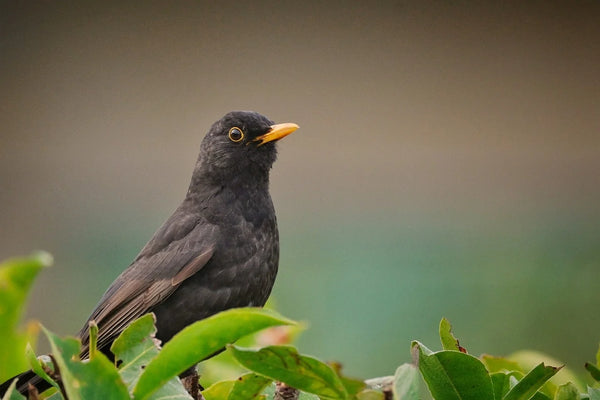
Common Blackbird: Identification, Behaviour, and Feeding Tips
Share
The common Blackbird (Turdus merula) is a member of the thrush family. The male Blackbirds have a glossy black plumage, black-brown legs, a yellow eye-ring and an orange-yellow bill.
The females are all brown with a dull yellowish-brownish bill, and often with spots and streaks on their breasts.
It is often said in bygone times, Blackbirds and other songbirds were a delicacy, a fact we are reminded of in the rhyme:
Sing a song of sixpence,
A pocket full of rye.
Four-and-twenty Blackbirds,
Baked in a pie.
When the pie was opened
The birds begin to sing;
Wasn't that a dainty dish,
To set before the king.
This song was believed to parody the relationship between King Henry VIII of England and his second wife Anne Boleyn.
This much-loved garden bird is famous for its harmonious song, which is a varied call that can be a very loud rattle and the warning is given with its flickering wings and tail and sounds a little like “chook”. They can also often be heard quietly “singing to themselves” within the undergrowth - just going about their daily business.
The Blackbird is sleek and alert and is one of Britain’s favourite birds, they can be seen all year round with small numbers migrating to southern Europe for the winter, and you may find that between September and October the Blackbird is more absent from our gardens. Some may return during the winter months and are quite often joined by immigrants as a large number of Blackbirds migrate to the UK from Scandinavia and cooler parts of continental Europe.
They are a ground-feeding bird predominantly, but will seemingly happily visit a bird table for soft foods; however, their favourite diet is undoubtedly earthworms, insects and berries which can often be found in hedgerows. Live mealworms will give them essential protein and moisture and they can be a lifeline for Blackbirds when the ground's too hard to extract worms.
When it comes to supporting a Blackbird's diet with supplementary wild bird food, try Prosecto Insectivorous - it's a year-round soft food blended especially for insect-eating birds and it is made to a unique formula which was originally recommended by bird experts. It is as near to the softbill's natural food as we, at Haith's, can get. Containing a variety of ingredients blended with special oils and Bakers' Honey, it provides vitamins and minerals. Blackbirds love this protein-rich mixture, and can easily be fed from a softfood feeder or a sheltered bird table; it is also suitable for feeding from a small container at the base of shrubs or bushes.

Written by Tina Jakes
